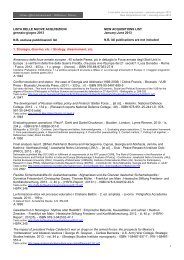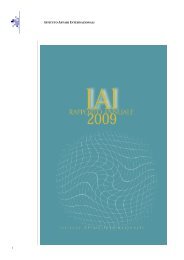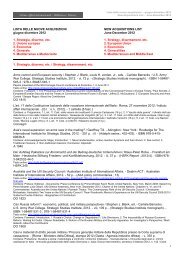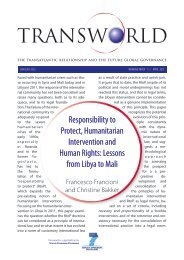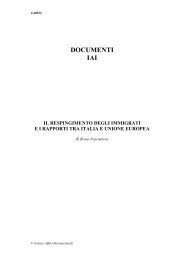Paper - IAI - Istituto Affari Internazionali
Paper - IAI - Istituto Affari Internazionali
Paper - IAI - Istituto Affari Internazionali
Create successful ePaper yourself
Turn your PDF publications into a flip-book with our unique Google optimized e-Paper software.
<strong>IAI</strong>0909<br />
THE TREATY ON FRIENDSHIP, PARTNERSHIP AND COOPERATION<br />
BETWEEN ITALY AND LIBYA: NEW PROSPECTS FOR COOPERATION<br />
IN THE MEDITERRANEAN?<br />
by Natalino Ronzitti *<br />
On August 30 2008, Italian Prime Minister Silvio Berlusconi flew to Benghazi to sign<br />
the Treaty on Friendship, Partnership and Cooperation between Italy and Libya,<br />
concluding the long negotiating process that began under previous Italian governments<br />
and was accelerated by the current administration. 1 The Treaty was meant to put an end<br />
to the dispute between the two countries and Libya’s claims relating to Italian<br />
colonialism. In greeting Colonel Muammar Gheddafi, Berlusconi expressed his regret<br />
for the colonial period in very strong terms.<br />
In the name of the Italian people, as head of the government, I feel it my duty to<br />
apologize and express my sorrow for what happened many years ago and left a scar on<br />
many of your families. 2<br />
Berlusconi also handed over the statue of the Venus of Cyrene, which was brought to<br />
Italy during the colonial period and which the Italian administrative court ruled had to<br />
be returned to Libya in a controversial judgment of 2007. 3<br />
1. Past record<br />
The provisions of the Benghazi agreement were already contained in nuce in the July 4<br />
1998 Joint Communiqué signed for Italy by then Foreign Minister Lamberto Dini as a<br />
premise for an agreement with broader political scope. However, the ups and downs in<br />
Italian-Libyan relations prevented such an agreement from being concluded, in spite of<br />
the efforts of all governments in the following decade, including those of centre-left.<br />
Relations with Libya have never been easy, because of both the colonial heritage and<br />
the embargo imposed on Libya by western countries. After Gheddafi’s rise to power in<br />
1969, Italians were thrown out of the country and their property confiscated.<br />
Nevertheless, trade relations continued thanks to ENI, the Italian national oil and gas<br />
company, which maintained a constant presence in the country, even during the years of<br />
international terrorism and sanctions on Libya . And, of course, Libyan investments in<br />
Fiat.<br />
* Scientific Advisor, <strong>Istituto</strong> <strong>Affari</strong> <strong>Internazionali</strong>, Rome; Professor of International Law, LUISS<br />
University, Rome. The author is grateful to Ms Silvia Colombo, junior researcher at the <strong>IAI</strong>, for her<br />
research assistance.<br />
1 The text of the Treaty in Italian only is annexed to the law authorizing the ratification and<br />
implementation (Law no. 7 of February 6 2009).<br />
2 (All quotes translated from the Italian) http://www.it/Presidente/Interventi/testo_int.asp?d=40139.<br />
3 N. Ronzitti, “Sugli obblighi di restituzione dell’Italia la sentenza amministrativa non convince”, in<br />
Guida al Diritto. Il Sole 24 ore, no. 21, 2007, pp. 100 ss.<br />
© <strong>Istituto</strong> <strong>Affari</strong> <strong>Internazionali</strong><br />
2



